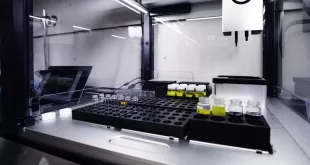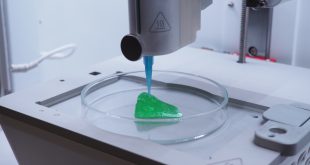By Jana Manolakos
It isn’t easy to improve on nature, but a new engineering biology hub at the University of Saskatchewan’s Global Institute for Food Security (GIFS) has received funding to take up the challenge. With an investment of $3.2 million from the Canada Foundation for Innovation (CFI), GIFS is launching a one-of-a-kind research and innovation centre and biomanufacturing facility dedicated to the agri-food sector and food security. The federal funding will augment the $9.2 million price tag for the facility, which opens its doors to researchers, entrepreneurs and students in the coming months.
The Engineering Biology Agri-food Innovation Centre has the potential to transform what consumers eat, the medicines they take and the fuels they use. It will foster the type of advances in engineering biology that are contributing to the global bio-economy.
When the new facility at the University of Saskatchewan (USask) was announced, Vice-President of Research Dr. Baljit Singh said, “This new centre will establish the University of Saskatchewan as the national node for engineering biology applications in agriculture and food that will accelerate science and innovation to support and grow our agri-food sector. Using automation and other emerging technologies, our researchers will harness the power of biology to design more nutritious and sustainable crop varieties and food products.”
The funding will be used for critical infrastructure including robots, computers, cell culture systems and other equipment for the centre. “We’re using it to purchase equipment that will enable the engineering biology platform. Engineering biology is a critical enabler to the global bio-economy,” stated Steve Webb, GIFS executive director and CEO. He is also a member of the National Engineering Biology Steering Committee, which is helping drive the influx of engineering biology in Canada. Last November the committee released a white paper, “Engineering Biology – A platform technology to fuel multi-sector economic recovery and modernize bio-manufacturing in Canada.”
The new centre is similar to Concordia University’s Centre for Applied Synthetic Biology, which focuses mainly on health applications. “The planning stage for the project was relatively short,” explains Webb. “Consultation with researchers on campus and industry within the agri-food ecosystem demonstrated the real need and demand for its capability. It integrates across various verticals and horizontally into other business areas – health, manufacturing, etc.”
Rapidly growing innovation with ancient roots
Historically, far more rudimentary forms of biomanufacturing and bioengineering technologies existed as early as 5,000 years ago, when the Mesopotamians first fermented lactobacillus bacteria to make yogurt and the ancient Egyptians used yeast to cause bread to rise and beer to bubble.
Today, engineering biology is an exploding field that combines genomics and molecular biology with high-performance computing, automation and artificial intelligence, unleashing the power to transform what we eat, medicines we take – like COVID vaccines – and the fuels we use. A May 2020 report from the McKinsey Global Institute, The Bio Revolution: Innovations transforming economies, societies and our lives, estimates engineering biology could have a global economic impact of up to $4 trillion in the next 10 to 20 years, with more than a third of this growth in the agri-food area.
In the coming months, more than 20 researchers will set up shop in the 10,000-sq.ft. lab space, with access to platforms for advanced computational and genomics support. They’ll be exploring such areas as climate change–resilient canola varieties, new ingredients and flavours for pulse-based meat alternatives, and non-animal enzyme alternatives for the dairy industry.
“Engineering biology integrates automation, biology and computation – the ‘ABC’ approach – to advance research and new product development by accelerating the design-build-test-and-learn cycle, beyond the reach of traditional approaches,” explains Webb.
USask plant scientist Tim Sharbel believes that engineering biology will enable researchers to advance the application of genomics to agriculture. “We can now identify important genes, but translating this into something that’s useful to industry and beneficial to society is a gap that’s been very difficult until now,” he explains. Significant automation and computational power is required to enable the rapid production and testing of thousands of gene and protein variants, for the development of new products and plant varieties.
For USask pharmacy researcher Jane Alcorn, the lab will enable creating compounds to discover new drug candidates. USask nutrition researcher Carol Henry will use new protein variants produced at the facility to improve the nutritional quality of foods, while agricultural researcher Bobbi Helgason is looking to enhance plant-microbial interactions that help plants with stress tolerance. Key researchers from Agriculture and Agri-Food Canada, the National Research Council and the private sector also will use the facility.
Investing in powerful automation and machine learning
“We’re talking about automation and machine learning. This is something that we need to recognize…is a great investment. Countries like the U.S., U.K., Japan, the European Union and Singapore have all been investing in this,” Webb commented in a CFI news release. He adds, “It’s really about being able to harness the power of automation, miniaturization, computational power and biology to create new and better tools and technologies – things like herbicides, fungicides, insecticides, new plant varieties – even faster, and new seed treatments based on microbial treatments. There’s so much we can give to farmers with this technology.”
The centre’s technology platform – comprising separate “suites” for engineering biology, proteomics and genomics, and metabolomics (the study of small molecules in an organism) – will be integrated into the workflow of GIFS’s existing technology platforms, which include the Omics and Precision Agriculture Laboratory (OPAL), Data Management and Analytics, and Cell Biology.
“GIFS and the Global Institute for Water Security partner with the University of Saskatchewan through Copernicus, a general purpose, high-performance computing infrastructure,” Webb explains. “Through this system, GIFS has storage and computing capacity available for use. GIFS leverages this capacity for its technology platforms and science programs, including OPAL and its imaging technologies. GIFS’s biomanufacturing facility will represent its own storage and computational node in the Copernicus environment.”
Designed for efficient workflow, the facility will use a range of standard laboratory robots. Among these, there are automated liquid handling platforms, like the Agilent Bravo and TECANS robotic systems for dispensing liquids, colony pickers that automate the process of isolating colonies or species so they can be identified, and the KingFisher Flex, a lab instrument used for extracting and purifying DNA, RNA, protein and cells from a large number of samples.
Essential collaborations
Webb says academic and industry researchers will be able to order the DNA, RNA, peptides and other proteins they need for their studies from the centre’s bio-manufacturing facility, or “biofoundry.” The research will be proprietary to GIFS and its clients; however, the engineering biology technology platform will be integrated into the emerging Canadian engineering biology network
“What GIFS develops and uses will fit the national and international standards for foundries, and the institute will have an unencumbered path to market,” explained Webb. As the centre continues to ramp up, the foundry is expected to begin operating again in the next 12 months
Collaboration is key for the centre, which looks to work with other Canadian universities that have biofoundries, as well as with industry and international partners such as the U.S., U.K., Australia and Singapore. Moving forward, GIFS will continue to engage the National Engineering Biology Steering Committee and its network of key players in the space, like Ontario Genomics, the National Research Council of Canada, Agriculture and Agri-Food Canada, Concordia University, the University of British Columbia, the University of Toronto, McMaster University and other experts in bringing core biotechnologies forward and products to market. The group created a technology roadmap for promoting engineering biology as a national opportunity to advance Canada’s knowledge-based economy and create high-quality jobs and training opportunities. It will also ensure that Canadian biotechnology companies and manufacturers don’t get left behind in the rapidly growing global market.
 BioLab Business Magazine Together, we reach farther into the Canadian Science community
BioLab Business Magazine Together, we reach farther into the Canadian Science community





